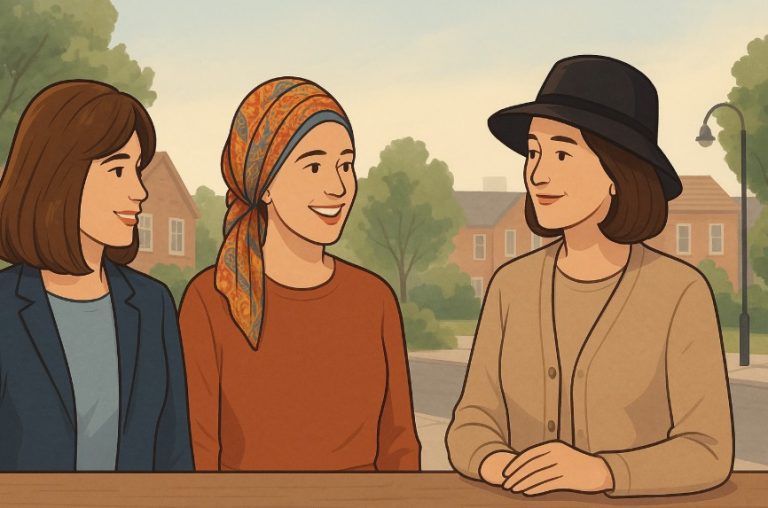Why Would a Straight Couple Want a Civil Partnership?
Why would a heterosexual couple opt for a civil partnership when marriage has long been the traditional route? In recent years, the UK has seen a significant shift in how relationships are recognised legally, with more couples choosing to formalise their unions through civil partnerships instead of marriage.
Initially introduced to provide legal protections for same-sex couples, civil partnerships have evolved into a modern and inclusive option for all, regardless of gender.
For many opposite-sex couples, marriage may not align with their values, beliefs, or lifestyle. Whether it’s due to philosophical reasons, a desire for equality, or simply wanting legal protection without religious or historical ties, the civil partnership offers a compelling alternative.
This blog explores the growing appeal of civil partnerships for straight couples, their legal benefits, and why this route is becoming an increasingly popular choice across the UK.
What Is a Civil Partnership?

Why would a heterosexual couple, with the option of marriage, choose a civil partnership instead? This question has become increasingly relevant since the UK government extended the right to enter into civil partnerships to opposite-sex couples in 2019.
For many, this legal alternative offers a modern, meaningful, and less traditional way to formalise a committed relationship.
In the UK, civil partnerships were originally created by the Civil Partnership Act 2004 as a way to offer same-sex couples similar legal protections to marriage.
It wasn’t until the Supreme Court ruled in 2018 that it was discriminatory to deny these partnerships to opposite-sex couples that the law evolved to be more inclusive. From 31st December 2019, civil partnerships became legally available to all couples, regardless of gender.
A civil partnership is a legally recognised relationship, offering nearly the same legal responsibilities, protections, and benefits as marriage. However, unlike marriage, civil partnerships do not carry religious or historical connotations, making them an appealing option for couples who want legal recognition without the traditional framework of matrimony.
What Legal Rights Do Opposite-Sex Couples Get in a Civil Partnership?

One of the primary reasons a straight couple might choose a civil partnership is the legal security it offers. The law treats civil partners very similarly to married couples across a wide range of areas, ensuring they are protected should life take an unexpected turn.
Couples who form a civil partnership gain:
- Inheritance rights without the need to pay inheritance tax
- Automatic next-of-kin recognition in hospitals and during emergencies
- Parental responsibility, particularly if children are born within the partnership
- Access to pension and survivor benefits, including rights to private and occupational pensions
- Legal clarity in ownership and division of assets, both during and in the event of dissolution
For cohabiting couples, these protections are not automatic, even if they’ve lived together for decades. Civil partnerships provide clear and recognised legal backing, removing ambiguity and giving both partners security.
What Are the Benefits of a Civil Partnership for Straight Couples?
While many people associate marriage with stability and long-term commitment, some straight couples feel uncomfortable with the institution of marriage due to its history, symbolism, or religious associations. For them, civil partnerships offer a more neutral, modern, and equally binding alternative.
A civil partnership can be beneficial in several ways:
- It provides full legal rights similar to marriage, including joint parental responsibilities and financial protections.
- It removes religious or cultural pressure from the equation, allowing couples to commit on their own terms.
- It ensures equal status, with no tradition of name changes or expectations based on gender roles.
- It can offer tax efficiency, including Capital Gains Tax exemptions for transfers between civil partners, as well as inheritance tax benefits.
Many couples view a civil partnership as a cleaner, fairer option that better reflects their personal values and modern lifestyles.
Why Might a Straight Couple Prefer a Civil Partnership Over Marriage?

The choice to enter a civil partnership instead of getting married is often rooted in deeply personal beliefs. For some, marriage might feel outdated or symbolic of religious or patriarchal systems they don’t identify with. A civil partnership offers an alternative that is legally sound but socially and culturally distinct.
Common reasons why heterosexual couples choose this route include:
- Philosophical objections to the traditional institution of marriage
- Desire for equality in a relationship without the societal expectations that sometimes accompany marriage
- Preference for a less formal union, often with no public ceremony or change of surname
- Wishing to secure legal rights without engaging in a religious or ceremonial process
Couples often feel empowered by the ability to shape their relationship on their own terms, with the reassurance that they’re protected under UK law.
How Can a Straight Couple Apply for a Civil Partnership in the UK?

The process of registering a civil partnership is quite straightforward in the UK. Much like marriage, it involves giving notice and attending an official registration.
To enter into a civil partnership, couples must:
- Give notice of their intention at a local register office at least 29 days before the date they plan to form the partnership.
- Provide necessary documentation, including proof of identity, nationality, and address.
- After the notice period, register the partnership at a designated venue or register office. There’s no requirement for vows or a ceremony, although many couples do choose to have a celebration.
Unlike traditional weddings, there’s no need for a ceremony or exchanging of vows, and couples are not legally required to make a verbal declaration. This simplicity is one of the reasons some couples find civil partnerships more appealing.
What Are the Common Misconceptions About Civil Partnerships?
Despite being legally available to heterosexual couples for several years now, civil partnerships still carry a number of misconceptions.
One major myth is that civil partnerships are only for same-sex couples. This was true when they were first introduced, but the law has since changed. Today, civil partnerships are available to all couples, regardless of gender.
Another common misunderstanding is that civil partnerships are the same as just living together. In reality, the two are vastly different. Unlike cohabiting partners, civil partners have automatic legal rights and responsibilities under UK law.
Finally, some believe that dissolving a civil partnership is more complicated than divorce, but the process is largely the same. A civil partnership can be dissolved by court order, following similar legal grounds used in divorce proceedings.
How Does a Civil Partnership Compare to Cohabitation in the UK?

The contrast between civil partnership and cohabitation is stark, especially when it comes to legal rights. Many couples live together under the false belief that “common law marriage” grants them the same protections as marriage or civil partnership, but this simply isn’t true in the UK.
Here’s a comparison:
| Feature | Cohabitation | Civil Partnership |
| Legal Status | Not recognised | Legally recognised |
| Inheritance Rights | No automatic rights | Same as married couples |
| Property Rights | Varies based on ownership | Shared responsibilities |
| Parental Rights | Limited unless registered | Equal and protected |
| Next of Kin | Not automatically recognised | Fully recognised |
For couples who want peace of mind and shared legal rights, a civil partnership offers much more stability than informal cohabitation.
How Is Public Perception Changing Around Heterosexual Civil Partnerships?
When the first opposite-sex civil partnerships were registered in the UK in early 2020, it made headlines. Since then, the numbers have steadily increased, reflecting a societal shift towards more inclusive and flexible relationship models.
According to data from the Office for National Statistics (ONS), the number of opposite-sex civil partnerships formed in England and Wales in 2020 was 2,282 despite the impact of COVID-19 restrictions. In subsequent years, the figures have continued to grow, with thousands of couples now opting for this path.
The public perception is changing rapidly. Civil partnerships are no longer seen as a “same-sex alternative” but rather as a legitimate, modern relationship choice for all. Campaigns by high-profile couples and growing awareness of cohabitation’s legal risks have helped shift attitudes.
Is a Civil Partnership the Right Choice for Every Straight Couple?

While civil partnerships are an attractive option for many, they may not suit everyone. Couples considering this path should reflect on their motivations and long-term goals.
Key considerations include:
- Whether you want legal protection without a traditional marriage
- How your family or social circle might view the decision
- Your personal beliefs around gender roles, traditions, and commitment
- Financial planning and estate considerations
It’s often helpful to consult a family solicitor or legal advisor to fully understand the implications and benefits before proceeding.
What Should Straight Couples Know Before Choosing a Civil Partnership?
Civil partnerships are a valuable option, but they’re not entirely without limitations. Although they mirror marriage in most legal areas, they still require dissolution through the courts if the relationship ends. This means couples must still navigate legal proceedings in the event of a breakup.
That said, many couples find the lack of ceremony requirements and historical baggage refreshing. It allows them to focus on the legal and practical aspects of partnership, rather than the symbolic ones.
Ultimately, civil partnerships offer a modern alternative that aligns with the values of many contemporary couples.
Conclusion
Civil partnerships have emerged as a modern and equal alternative to traditional marriage, offering legal clarity, financial protection, and social recognition for couples who want a formal commitment without the cultural and historical weight of marriage.
For straight couples in the UK, this option represents freedom of choice, an opportunity to define their relationship on their own terms while still enjoying the same rights as married couples.
From inheritance and parental rights to pensions and legal protections, civil partnerships provide a robust framework for couples who seek security without symbolism.
As public perception continues to shift and more people embrace diverse relationship models, civil partnerships will likely play an even more prominent role in how we think about long-term commitment. For many, it’s not about rejecting marriage, it’s about choosing a partnership that truly reflects who they are.
FAQs About Civil Partnerships for Straight Couples
Do straight couples have the same rights in a civil partnership as married couples?
Yes, opposite-sex civil partners have virtually the same rights and responsibilities as married couples under UK law.
Can a civil partnership be converted into a marriage?
Yes. Couples can convert their civil partnership into a marriage through an administrative or ceremonial process at a register office.
Is a civil partnership more cost-effective than a wedding?
Generally, yes. Since there’s no requirement for a ceremony or celebration, many couples find it less expensive than a traditional wedding.
Will civil partnerships be recognised if I move abroad?
This depends on the country. Some recognise UK civil partnerships as equivalent to marriage, while others may not offer the same recognition.
Can children be born into or adopted by a civil partnership?
Yes, and civil partners have equal parental rights and responsibilities, just like married parents.
Do civil partners need to change surnames?
No. There’s no legal requirement to change names, but partners may choose to if they wish.
Can we form a civil partnership without a celebration?
Absolutely. A civil partnership only requires legal registration. A celebration is completely optional.







